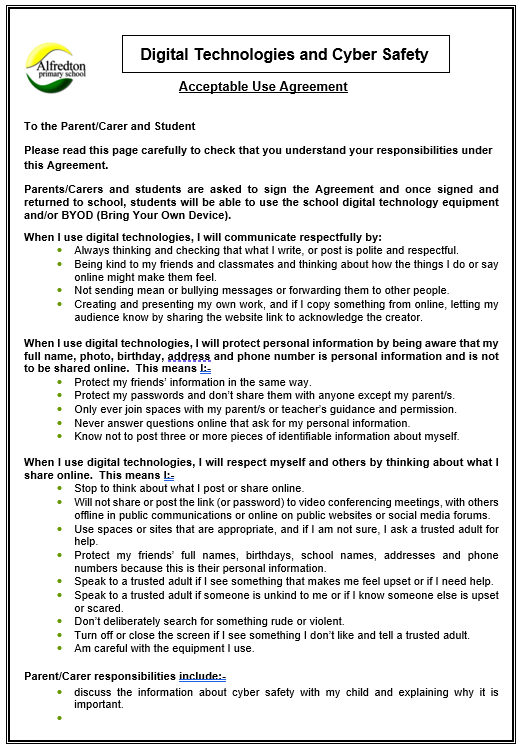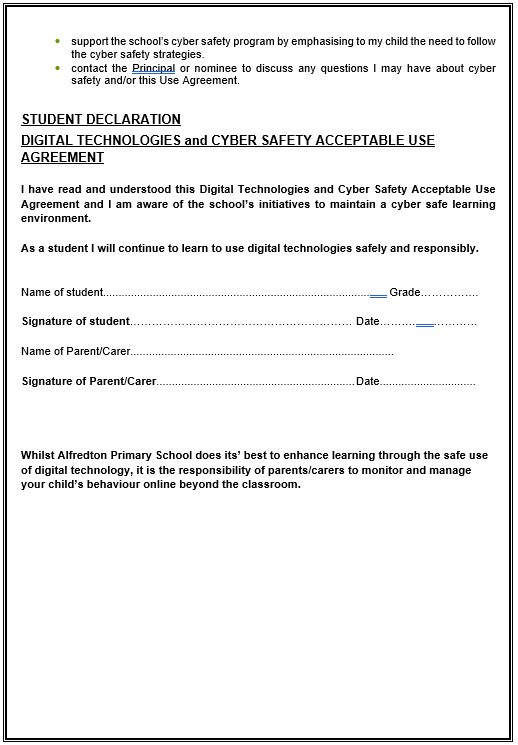Digital Learning

Help for non-English speakers
If you need help to understand the information in this policy please contact Alfredton Primary School on 5334 1572
Purpose
To ensure that all students and members of our school community understand:
- our commitment to providing students with the opportunity to benefit from digital technologies to support and enhance learning and development at school including our Bring Your Own Device (BYOD) program
- expected student behaviour when using digital technologies including the internet, social media, and digital devices (including computers, laptops, tablets)
- the school’s commitment to promoting safe, responsible and discerning use of digital technologies, and educating students on appropriate responses to any dangers or threats to wellbeing that they may encounter when using the internet and digital technologies
- our school’s policies and procedures for responding to inappropriate student behaviour on digital technologies and the internet
- the various Department policies on digital learning, including social media, that our school follows and implements when using digital technology
- our school prioritises the safety of students whilst they are using digital technologies
Scope
This policy applies to all students and staff at Alfredton Primary School.
Staff use of technology is also governed by the following Department policies:
- Acceptable Use Policy for ICT Resources
- Cybersafety and Responsible Use of Digital Technologies
- Digital Learning in Schools and
- Social Media Use to Support Student Learning.
Staff, volunteers and school councillors also need to adhere to codes of conduct relevant to their respective roles. These codes include:
- Alfredton Primary School’s Child Safety Code of Conduct
- The Victorian Teaching Profession Code of Conduct (teaching staff)
- Code of Conduct for Victorian Sector Employees (staff)
Definition
For the purpose of this policy, “digital technologies” are defined as digital devices, tools, applications and systems that students and teachers use for learning and teaching; this includes Department-provided software and locally sourced devices, tools and systems.
Policy
Vision for digital learning at our school
[The purpose of this section is to explain to the community the role that you would like digital technologies to play within the school environment. The text below is included as a sample only and should be amended to reflect your school community.]
The use of digital technologies is a mandated component of the Victorian Curriculum F-10.
Safe and appropriate use of digital technologies, including the internet, apps, computers and tablets, can provide students with rich opportunities to support learning and development in a range of ways.
Through increased access to digital technologies, students can benefit from learning that is interactive, collaborative, personalised, engaging and transformative. Digital technologies enable our students to interact with and create high quality content, resources and tools. It also enables personalised learning tailored to students’ particular needs and interests and transforms assessment, reporting and feedback, driving new forms of collaboration and communication.
Alfredton Primary School believes that the use of digital technologies at school allows the development of valuable skills and knowledge and prepares students to thrive in our globalised and inter-connected world. Our school’s vision is to empower students to use digital technologies safely and appropriately to reach their personal best and fully equip them to contribute positively to society as happy, healthy young adults.
Personal Devices at Alfredton Primary School
Alfredton Primary School operates a Bring Your Own Device (BYOD) program from Year 4 to 6. Classes at our school are delivered with the use of tablets and notebook computers.
Parents/carers are invited to purchase or lease a device for their child to bring to school. Alfredton Primary School has made special arrangements with Learning with Technology who offer an online purchasing portal and onsite repair support for our students.
Students from Year 4 to 6 are invited to bring their own device to school each day to be used during class time for different learning activities. When bringing their own device to school, students should ensure that it:
- Is fully charged each morning
- Is brought to school in a protective case
- has at least 64GB of storage
- operates on Windows 10 or later
Please note that our school does not have insurance to cover accidental damage to students’ devices, and parents/carers are encouraged to consider obtaining their own insurance for their child’s device and this available if the device is purchased through the Learning with Technology Portal.
Students, parents and carers who would like more information or assistance regarding our BYOD program are encouraged to contact Alfredton Primary School on 5334 1572
Safe and appropriate use of digital technologies
Digital technologies, if not used appropriately, may present risks to users’ safety or wellbeing. At Alfredton Primary School, we are committed to educating all students to use digital technologies safely, equipping students with the skills and knowledge to navigate the digital world.
At Alfredton Primary School, we:
- use online sites and digital tools that support students’ learning, and focus our use of digital technologies on being learning-centred
- use digital technologies in the classroom for specific purpose with targeted educational or developmental aims
- supervise and support students using digital technologies for their schoolwork
- effectively and responsively address any issues or incidents that have the potential to impact on the wellbeing of our students
- have programs in place to educate our students to be safe, responsible and discerning users of digital technologies
- educate our students about digital issues such as privacy, intellectual property and copyright, and the importance of maintaining their own privacy and security online
- actively educate and remind students of our Student Engagement policy that outlines our School’s values and expected student behaviour, including online behaviours
- have an Acceptable Use Agreement outlining the expectations of students when using digital technologies for their schoolwork
- use clear protocols and procedures to protect students working in online spaces, which includes reviewing the safety and appropriateness of online tools and communities and removing offensive content at the earliest opportunity
- educate our students on appropriate responses to any dangers or threats to wellbeing that they may encounter when using the internet and other digital technologies
- provide a filtered internet service at school to block access to inappropriate content
- refer suspected illegal online acts to the relevant law enforcement authority for investigation.
Distribution of school owned devices to students and personal student use of digital technologies at school will only be permitted where students and their parents/carers have completed a signed Acceptable Use Agreement.
It is the responsibility of all students to protect their own password and not divulge it to another person. If a student or staff member knows or suspects an account has been used by another person, the account holder must notify the classroom teacher immediately.
All messages created, sent or retrieved on the school’s network are the property of the school. The school reserves the right to access and monitor all messages and files on the computer system, as necessary and appropriate. Communications including text and images may be required to be disclosed to law enforcement and other third parties without the consent of the sender.
Information on supervision arrangements for students engaging in digital learning activities is available in our Yard Duty and Supervision Policy.
Social media use
Our school follows the Department’s policy on Social Media Use to Support Learning to ensure social media is used safely and appropriately in student learning and to ensure appropriate parent notification occurs or, where required, consent is sought. Where the student activity is visible to the public, it requires consent.
Our school has established a Facebook page to showcase events and student learning. The Facebook Policy outlines the guidelines for our Facebook page.
In accordance with the Department’s policy on social media, staff will not ‘friend’ or ‘follow’ a student on a personal social media account, or accept a ‘friend’ request from a student using a personal social media account unless it is objectively appropriate, for example where the student is also a family member of the staff.
If a staff member of our school becomes aware that a student at the school is ‘following’ them on a personal social media account, Department policy requires the staff member to ask the student to ‘unfollow’ them, and to notify the school and/or parent or carer if the student does not do so.
Student behavioural expectations
When using digital technologies, students are expected to behave in a way that is consistent with Alfredton Primary School’s Statement of Values, Student Wellbeing and Engagement policy, and Bullying Prevention policy.
When a student acts in breach of the behaviour standards of our school community (including cyberbullying, using digital technologies to harass, threaten or intimidate, or viewing/posting/sharing of inappropriate or unlawful content), Alfredton Primary School will institute a staged response, consistent with our student Code of Conduct and behaviour policies.
Breaches of this policy by students can result in a number of consequences which will depend on the severity of the breach and the context of the situation. This is included in the student acceptable Use Agreement.
COMMUNICATION
This policy will be communicated to our school community in the following ways:-
- Available publicly on our school’s website
- Included in staff induction and child safety training processes
- Discussed at staff briefings/meetings as required
- Discussed at parent information nights/sessions ie BYOD information sessions
POLICY REVIEW AND APPROVAL
| Policy last reviewed | June 2022 |
| Consultation | On may 26th the Digital Learning leaders were consulted in peparing this policy. |
| Approved by | Principal and School Council |
| Next Scheduled review date | June 2024 |
ANNEXURE A: Acceptable Use Agreement
Acceptable Use Agreement


